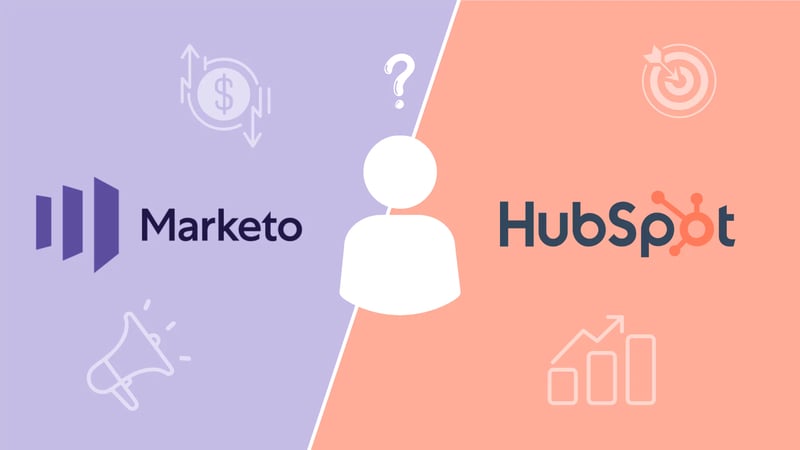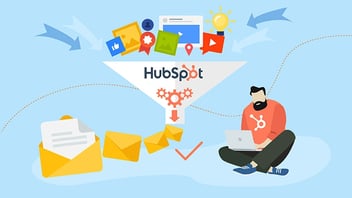HubSpot vs. Marketo: Choosing the Right Marketing Automation Platform
Are you feeling swamped by marketing tasks? Email blasts, lead nurturing, data analysis – it can get overwhelming. Fortunately, marketing automation platforms like HubSpot and Marketo can streamline your efforts and boost results. But which platform best suits your business needs?
Choosing the right marketing automation platform is a critical decision that can make or break your marketing efforts. The competition is fierce, with two titans like HubSpot and Marketo in the ring. But don't worry; this head-to-head comparison will equip you to identify the best platform for your business and budget.
HubSpot vs. Marketo
If you're unfamiliar with these platforms, we'll break them down for you.
HubSpot is a versatile all-in-one marketing platform offering a comprehensive suite of tools designed to attract, convert, and delight customers. Think user-friendly landing pages, email marketing automation, seamless CRM integration, and powerful analytics, all presented in an intuitive interface.
Marketo (acquired by Adobe in 2018) is an enterprise-grade platform designed to support intricate marketing campaigns. Its robust automation capabilities, multi-channel marketing prowess, and granular reporting tools cater to data-driven marketers seeking to execute complex strategies and measure results with precision.
Now, let's get into the side-by-side comparison of the two platforms.
Lead Generation and Nurturing
-
HubSpot: Provides user-friendly landing page and form builders, automated email marketing with A/B testing, and basic lead scoring tools.
-
Marketo: Offers more advanced lead nurturing capabilities with dynamic content, personalized email sequences, and multi-channel lead scoring based on various engagement metrics.
CRM Integration
-
HubSpot: Includes a built-in CRM with seamless integration across marketing and sales, simplifying data sharing, collaboration, and maintaining your CRM database.
-
Marketo: Integrates with various CRM systems through APIs and connectors, but native integration is unavailable, requiring additional setup and potential data synchronization challenges.
Marketing Analytics and Reporting
-
HubSpot: Delivers intuitive dashboards with clear visualizations and actionable insights into campaign performance and ROI, suitable for both technical and non-technical users.
-
Marketo: Offers robust reporting capabilities with granular data analysis, attribution modeling, and advanced reporting features for in-depth campaign analysis and optimization.
Automation Capabilities
-
HubSpot: Features a drag-and-drop workflow builder for automating basic marketing tasks like email triggers and social media posting, suitable for low-complexity campaigns.
-
Marketo: Provides advanced automation functionalities, including branching logic, API integrations, and complex triggers, enabling sophisticated campaign orchestration and dynamic personalization.
Ease of Use
-
HubSpot: Renowned for its user-friendly interface and intuitive design, making it accessible for users with limited technical expertise.
-
Marketo: Has a steeper learning curve due to its robust features and complex functionalities, requiring technical knowledge for optimal utilization.
Pricing
-
HubSpot: Offers tiered pricing plans based on features, users/seats, and contacts, making it a cost-effective option for small and medium businesses.
-
Starter: Starts at $45 per month, billed annually or monthly. Includes basic marketing tools like email marketing, landing pages, and forms.
-
Pro: Starts at $800 per month, billed annually. Adds CRM features, lead scoring, and marketing automation.
-
Enterprise: Starts at $3,600 per month, billed annually. Offers advanced features like predictive lead scoring, revenue attribution, and custom reporting.
-
-
Marketo: Employs a complex pricing structure with individual modules and user tiers, resulting in a higher cost point, primarily suited for larger enterprises with significant budgets.
-
Starter: Starts at $1,450 per month, billed annually. Includes basic marketing automation and email marketing capabilities.
-
Pro: Starts at $3,000 per month, billed annually. Adds advanced marketing automation, lead nurturing, and reporting features.
-
Elite: Starts at $8,000 per month, billed annually. Offers enterprise-level scalability, multi-channel marketing, and custom reporting.
-
Note: These are just starting prices, and the actual cost may vary depending on the number of users, features, and add-ons you select. Both platforms offer free trials, so you can test-drive them before committing to a paid plan.
HubSpot: Strengths and Weaknesses
Strengths:
-
Ease of use: HubSpot's intuitive interface and drag-and-drop functionality make it accessible to users with limited technical expertise. This is especially attractive for small and medium businesses with lean marketing teams.
-
Cost-effectiveness: HubSpot offers tiered pricing plans that scale with your business needs, making it a cost-effective option for a wide range of companies.
-
Built-in CRM: HubSpot's built-in CRM seamlessly integrates with its marketing tools, eliminating data silos and streamlining workflows for improved collaboration between marketing and sales teams.
-
Strong inbound marketing focus: HubSpot excels at attracting and nurturing leads through its powerful landing page builder, email marketing automation, and content management system.
-
Flexibility: HubSpot offers a variety of add-on tools and integrations, allowing you to customize the platform to fit your specific needs and workflows.
Weaknesses:
-
Limited advanced automation: While HubSpot offers basic automation features, it may not be powerful enough for complex multi-channel campaigns or highly personalized experiences.
-
Less granular reporting: HubSpot's reporting capabilities are clear and actionable but may lack the depth and granularity needed for advanced data analysis and attribution modeling.
-
Limited scalability: HubSpot's scalability can be a concern for larger enterprises with complex marketing needs and high volumes of data.
Marketo: Strengths and Weaknesses
Strengths:
-
Advanced automation: Marketo offers robust automation capabilities with branching logic, API integrations, and complex triggers, enabling sophisticated campaign orchestration and dynamic personalization.
-
Granular reporting: Marketo provides in-depth reporting with attribution modeling, advanced metrics, and custom dashboards, offering a comprehensive view of campaign performance and ROI.
-
Multi-channel marketing: Marketo excels at managing and optimizing marketing efforts across multiple channels, including email, social media, web, and mobile.
-
Enterprise-level scalability: Marketo's architecture is built for large organizations and can handle high volumes of data and complex marketing operations.
-
Data-driven approach: Marketo's focus on data and analytics empowers data-driven marketers to make informed decisions and optimize their campaigns for maximum impact.
Weaknesses:
-
Learning curve: The sheer depth of features and options in Marketo can be overwhelming for some users, leading to a steeper learning curve and potential for underutilization, making it less suitable for non-technical users.
-
Cost: Marketo's pricing structure is significantly higher than HubSpot, making it a less attractive option for smaller businesses or those with limited budgets.
-
Limited built-in CRM: While Marketo integrates with various CRM systems, it doesn't offer a native CRM solution like HubSpot, requiring additional setup and data synchronization efforts.
By understanding these specific strengths and weaknesses, you can make an informed decision about which platform best aligns with your business needs, technical resources, and budget.
Remember, the ideal platform is not just about features but also about finding one that seamlessly fits your unique workflow and empowers your marketing team to achieve their goals.
Deciding Factors
Choosing the right marketing automation platform (MAP) is no trivial task. You've compared features, dissected strengths and weaknesses, and now stand at a crossroads, ready to make the final call. But before you dive headfirst into either HubSpot or Marketo, consider these crucial deciding factors:
1. Business Size and Needs
Small and Medium Businesses (SMBs)
If your team is lean and your marketing needs primarily focus on lead generation and nurturing, HubSpot's user-friendly interface, cost-effective pricing, and built-in CRM might be the perfect fit. Its ease of use and intuitive design make it accessible even for non-technical users, while its marketing automation capabilities are robust enough for most SMB marketing campaigns.
Large Enterprises
For complex multi-channel campaigns, sophisticated data analysis, and advanced personalization, Marketo's enterprise-grade features shine. Its robust automation, advanced reporting, and multi-channel marketing capabilities cater to the needs of large teams and intricate marketing strategies. However, be prepared for a steeper learning curve and a higher price tag.
2. Technical Expertise
Limited Technical Knowledge
HubSpot's user-friendly interface and drag-and-drop functionality will be invaluable if your team lacks technical expertise. Its intuitive design and straightforward navigation make it easy to learn and use, allowing even non-technical users to leverage its marketing automation capabilities effectively.
Tech-Savvy Team
For teams comfortable navigating complex software and data analysis, Marketo's advanced features and customizable options will be a playground. Its branching logic, API integrations, and granular reporting require technical expertise to unlock the platform's full potential, but the rewards can be powerful for data-driven marketers.
3. Budget
Cost-Conscious
HubSpot's tiered pricing plans cater to varying budgets, making it a cost-effective option for small and medium businesses. You can start with basic features and scale up as your needs grow, without breaking the bank.
Investment-Ready
Marketo's higher price tag reflects its enterprise-grade features and complex functionalities. Be prepared for a significant investment, especially if you require additional modules or customizations. However, for large companies with substantial marketing budgets, the ROI can be significant.
4. Scalability
Future Growth
Consider your potential for future growth. If you anticipate expanding your marketing team and campaigns, choose a platform that can scale with you. HubSpot's flexible plans and add-on options allow you to scale gradually along the way.
Large-Scale Operations
Marketo's architecture is built for high volumes of data and complex marketing operations, making it ideal for large enterprises with significant marketing needs. Its scalability ensures your platform won't be a bottleneck as your company grows.
5. Additional Considerations
-
Integrations: Both platforms offer various integrations with CRMs, social media platforms, and other marketing tools. Assess your existing tech stack and choose the platform that integrates seamlessly with your preferred tools and workflows.
-
Support: Consider the level of customer support offered by each platform. Look for responsive and reliable support options, including training resources, documentation, and community forums.
-
Free Trials: Both platforms offer free trials, allowing you to test drive their features and functionalities firsthand. Take advantage of these trials to get a feel for the platform and its suitability for your needs.
Choosing the right marketing automation platform is a crucial decision that can make or break your marketing efforts. By carefully considering these deciding factors and understanding your unique business needs and resources, you can confidently navigate the maze and choose the platform that will empower your marketing team to reach new heights. Remember, the perfect platform will be the one that seamlessly blends with your existing workflows, empowers your team, and drives tangible results for your business.
This content is also available in:
- Deutsch: HubSpot vs. Marketo: Richtige Marketing-Plattform wählen
- Español: HubSpot vs. Marketo: Elegir plataforma
- Français: HubSpot vs Marketo: Choisissez votre plateforme marketing.
- Italiano: HubSpot vs. Marketo: Scegli la giusta automazione marketing.
- Română: HubSpot vs. Marketo: Alegerea platformei de marketing potrivite
- 简体中文: HubSpot 与 Marketo:选择合适的营销自动化平台










Leave a Comment